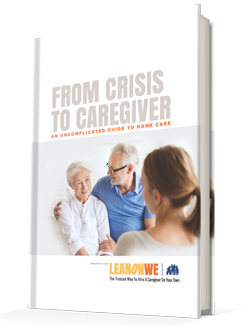Downsizing Your Parents’ Home: Resources and Benefits

Many experts would agree that once you hit your 40s and your parents hit their 70s, it’s time to have “the talk.”
It’s natural for this to be an uncomfortable conversation. For instance, your father may feel protective of his independence and resist the idea of any change. At some point, whether for safety or financial reasons, downsizing to a smaller home may make the most sense and allow him to live independently longer.
In this guide, we’ll walk you through how to approach this conversation and the many potential benefits that come with downsizing your parent’s home.
» Download our free guide to home care "From Crisis to Caregiver."
Starting the Conversation
More often than not, you will need to start the conversation with your parents rather than the other way around.
This can be a delicate conversation to have; some individuals might feel attacked or that their way of life is being threatened. We recommend approaching it from a place of collaboration that involves them in the process. For example, you can try the following strategies:
- Rather than suggest moving, offer to help declutter as a starting point to clearing things out. This may organically start a conversation around downsizing or help them realize the need to.
- Share personal experiences if you recently moved or decluttered, this helps frame the conversation in a positive light.
- Take the pressure off them – make it clear they do not need to move themselves, but they will have help before, during, and after the process.
It may be helpful to involve others in the conversation to thread the needle between providing support versus them feeling like you are imposing your will. Enlist trusted friends or advisors so that you do not bear the entire burden.
It’s rare that this is a “one and done” conversation, so make sure to have a “next step” outlined each time you bring this up with Mom or Dad.
Why Downsize?
There are practical advantages to downsizing that your parents might be interested in. The top two we see often are:
- Prolong independence
- Financial benefits
Downsizing Helps Prolong Independence
Downsizing to a smaller house, apartment, or condo can simplify your parent’s life in many ways that will ultimately help preserve his independence.
Downsizing helps here in a number of ways:
- Before moving, he’ll have to get rid of unnecessary possessions, which means he’ll have fewer things to keep organized in his new home.
- A smaller home is also easier to clean and maintain.
- By exchanging a multi-level house for a one-story, your parent will reduce his risk of falls. The safer your senior’s home is, the longer he will be able to age in place rather than seek other options.
- A move might also allow him to live closer to family, friends, and social activities.
With occasional help from an in-home caregiver, he might be able to continue living independently in this smaller home for many years. And, as his needs increase, you can expand the caregiver’s services to meet them.
Downsizing Has Financial Benefits
It may also help to keep the financial benefits of downsizing in mind.
If your parent is still paying a mortgage on his home, downsizing will reduce his monthly house payments. Even if his current home is paid off, property tax, utility, and maintenance costs will be reduced after his move.
If your parent is withdrawing money from retirement accounts to pay his mortgage, he has an added incentive to downsize. Since retirement account withdrawals are sometimes considered “income,” they may trigger additional taxes on your parent’s Social Security benefits. Reducing your parent’s mortgage payment, and hence retirement account withdrawals can reduce this potential tax liability.
These are just a few examples of the financial concerns that seniors face, and oftentimes, downsizing is a good start to mitigating them.
Prepare for Emotional Challenges
Of course, selling a family home can be hard on everyone involved.
Many memories were made there, and long-time neighbors may be close friends. The comfort of familiar faces, streets, and stores will be lost after your parent moves.
This is not a conversation to rush through just to make a decision. It’s important to acknowledge this loss and give your parent time to work through it. As we said earlier, it may help to talk to others who have recently downsized, spend plenty of time exploring alternative housing options, and encourage your parent to take an active role in the process.
Explore Your Resources
If your parent is struggling with this change, you may want to look for outside support. The National Association of Senior Move Managers assists seniors and their families with both the physical and emotional challenges associated with downsizing.
Senior Move Managers often have backgrounds in gerontology, social work, or nursing and share a commitment to helping older adults. They can provide resources and strategies for saving money and reducing stress throughout this difficult transition.
Aging Life Care Professionals are also educated and experienced in geriatric care management. Among other things, they can help you evaluate your parent’s needs and advise you regarding appropriate housing options.
Thinking About Homecare? Download Our Free Guide “From Crisis to Caregiver”
One of the top benefits of downsizing is prolonging your parent’s independence. With the help of a caregiver, Mom or Dad can age in place rather than leave their home entirely.
If the thought of hiring a caregiver makes you feel overwhelmed, we recommend downloading our free eBook, “From Crisis to Caregiver: An Uncomplicated Guide to Home Care.”
This eBook discusses the ins and outs of hiring a caregiver, arming you with a trustworthy resource to make the best decision for your loved one. Our eBook takes a no-nonsense look at:
- The realities of financing senior care.
- Straight talk about the pros and cons of the three common care options.
- Our own stories of hiring caregivers as a way to highlight the unexpected pitfalls you’ll want to avoid.
After reading “From Crisis to Caregiver,” you’ll know how to find and hire a caregiver on your own but still have access to services you wouldn’t normally have with a private caregiver, such as backup help and expert advice. Most importantly, you’ll be able to approach the process with confidence and peace of mind.

